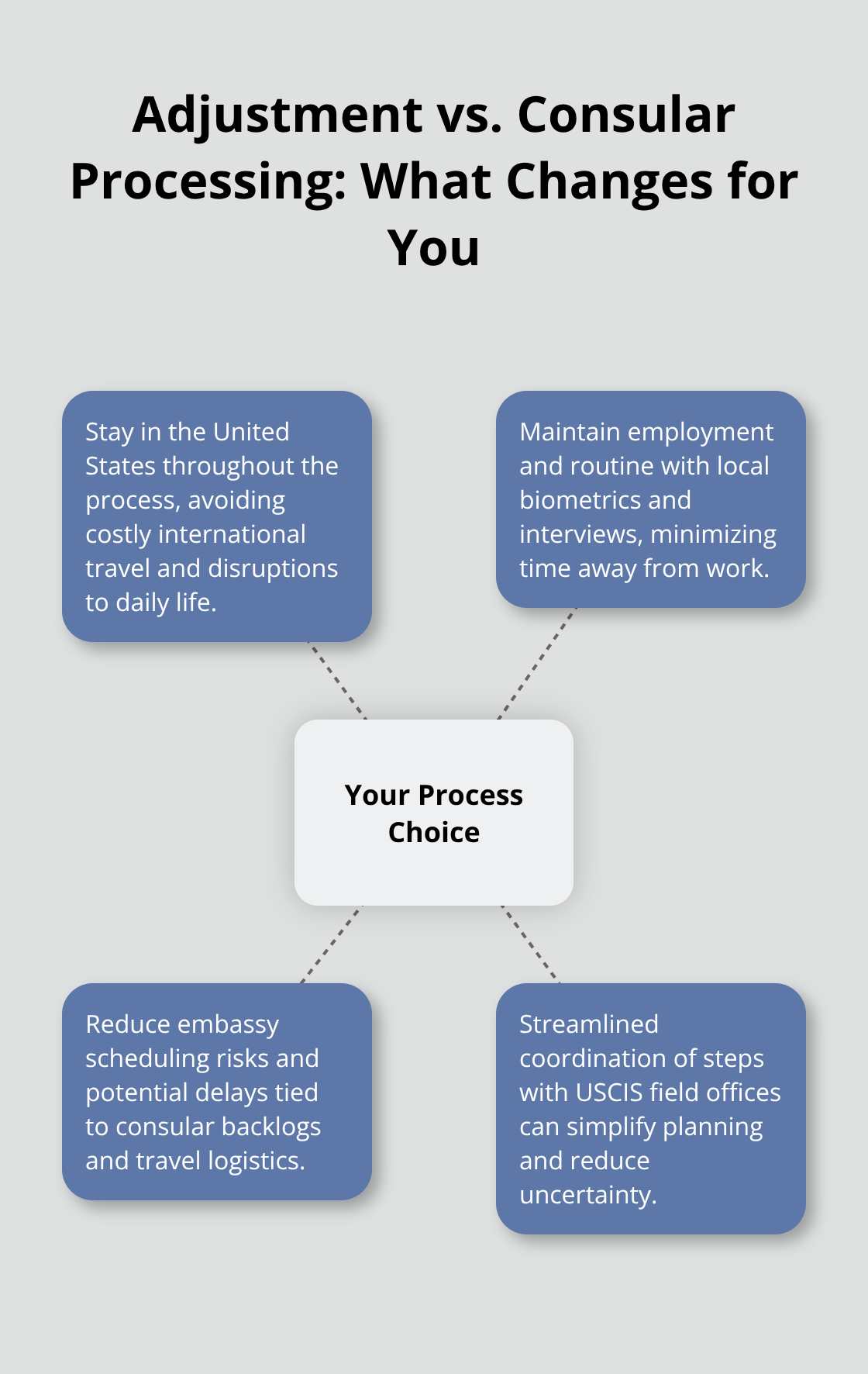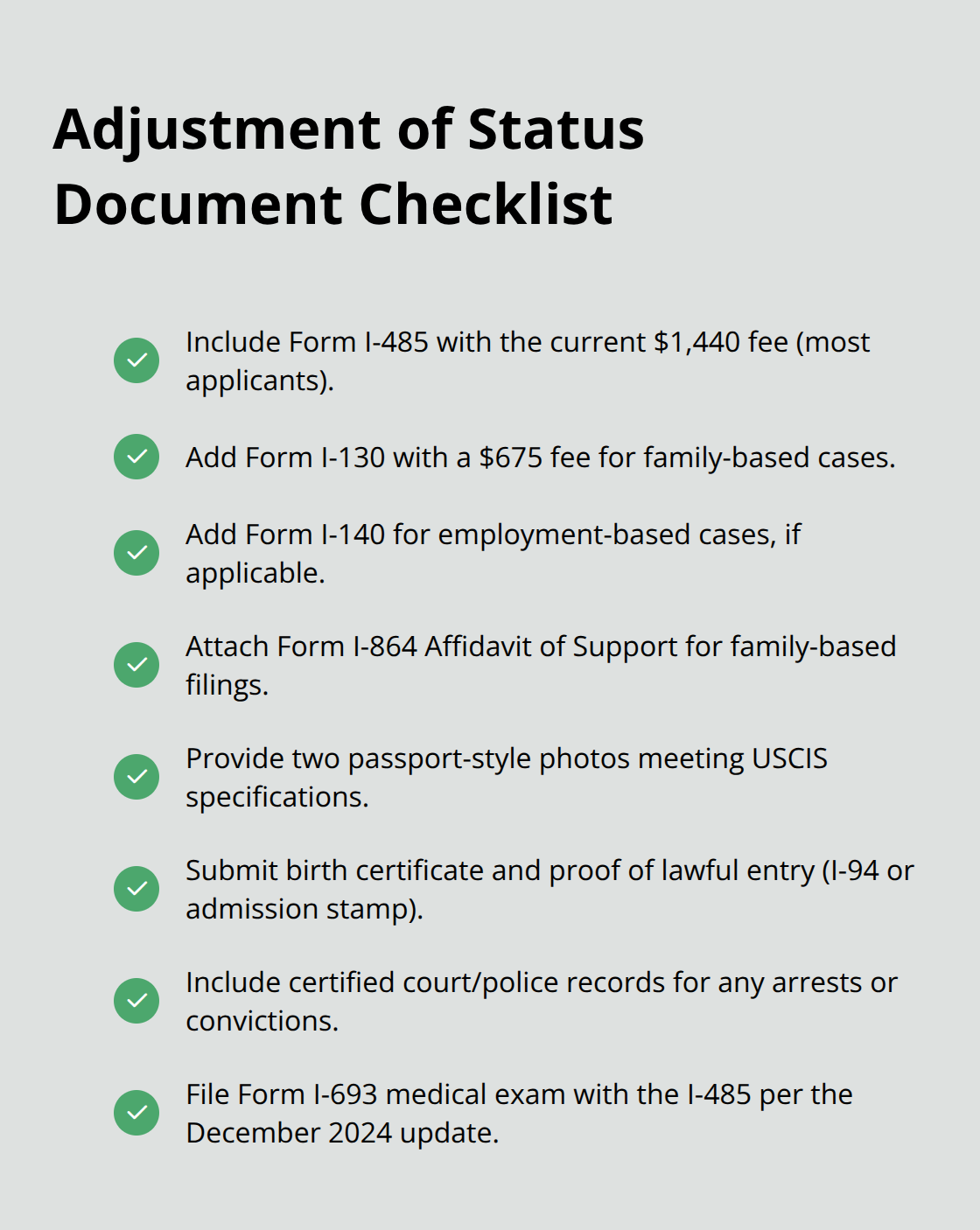
How to Adjust Your Status in the US
Adjustment of status in the US allows eligible immigrants to become permanent residents without leaving the country. This process can save months of waiting and avoid the complexities of consular processing abroad.
At Law Offices of Jeffrey A. Thompson, we guide clients through every step of this immigration pathway. The right preparation and documentation make the difference between approval and costly delays.
Why Choose Adjustment Over Consular Processing
Adjustment of status keeps you in the United States throughout the entire green card process, while consular processing requires you to leave the country and apply through a US embassy or consulate abroad. The choice between these paths determines your timeline, location, and level of complexity. Marriage-based adjustment of status currently takes 8.2 months for spouses of US citizens according to USCIS data, compared to consular processing which adds travel requirements and potential delays from embassy scheduling. Employment-based cases show even starker differences, with adjustment allowing you to maintain work authorization while consular processing can interrupt your career for months.
Location and Travel Requirements
Adjustment of status applications receive processing entirely within US borders through USCIS field offices. You attend your biometrics appointment and interview without leaving the country, which maintains your daily routine and employment. Consular processing forces you to travel to your home country or country of residence for the final interview at a US embassy. This travel requirement becomes problematic if you have established roots in America, own property, have children in school, or face safety concerns in your home country.

Timing Considerations and the 90-Day Rule
The 90-day rule creates risks for adjustment applicants who entered the US recently, as USCIS may question whether you had preconceived intent to immigrate when you entered on a temporary visa. To find an alien inadmissible for fraud or willful misrepresentation, there must be at least some evidence that would permit a reasonable person to find misrepresentation occurred. Applicants who file within 90 days of entry face increased scrutiny and potential denial based on presumed immigrant intent.
Eligibility Requirements and Strategic Decisions
Not everyone qualifies for adjustment of status. You must have entered the US with inspection and admission, maintained lawful status in most cases, and have an immediately available immigrant visa number. Immediate relatives of US citizens bypass annual caps and can file concurrently, which makes adjustment their obvious choice. Family preference categories and most employment-based applicants face years-long waits for visa availability (making consular processing sometimes faster despite the travel requirements).
The documentation requirements for both processes differ significantly, and understanding these differences helps you prepare the strongest possible application.
Required Documentation and Filing Process
Form I-485 serves as your primary adjustment of status application, but USCIS updated this form in December 2024 with a significant change that affects every applicant. The medical examination results on Form I-693 must now be submitted with your I-485 application, which eliminates the previous option to bring medical results to your interview. This change streamlines the process but requires upfront coordination with a USCIS-approved civil surgeon before you file.
Essential Forms and Supporting Documents
Your application package must include Form I-485 with current fees of $1,440 for most applicants (though reduced fees apply for children under 14). Family-based applicants need Form I-130 with an additional $675 fee, while employment-based cases require Form I-140. The Affidavit of Support on Form I-864 remains mandatory for family-based cases to prove you won’t become a public charge.
Two passport-style photographs, birth certificates, and documentation that proves your lawful entry into the United States complete the essential requirements. Criminal background documentation becomes necessary if you have any arrests or convictions, regardless of disposition. USCIS may reject applications without proper documentation, which includes medical exams and affidavit support.

USCIS Filing Fees and Payment Methods
USCIS accepts personal checks, money orders, or credit cards for payment, though they charge additional convenience fees for electronic payments. The fee calculator on their website helps determine exact costs for your specific situation. Applicants should maintain thorough records of all submitted evidence and correspondence with USCIS to track their case progress.
Processing Timeline Expectations
USCIS currently processes marriage-based adjustment applications in 8.2 months for spouses of US citizens, while spouses of permanent residents face 35-month delays due to visa availability constraints. Employment-based cases vary significantly by category and country of birth, with some cases taking years due to per-country limits. The biometrics appointment typically occurs within 4-6 weeks of submission, followed by interview scheduling once your priority date becomes current according to the monthly Visa Bulletin.
Even with proper documentation and timely submission, applicants often encounter challenges that can derail their cases without proper preparation and response strategies.
Common Challenges and How to Overcome Them
USCIS denied approximately 10% of adjustment of status applications in fiscal year 2024 due to incomplete documentation or errors. The most devastating mistake involves outdated forms, as USCIS only accepts current versions with specific revision dates printed in the bottom corners. Form I-485 revised in December 2024 now requires medical examination results at submission, not at the interview, which catches many applicants unprepared. Missing signatures, incorrect fees, or personal checks from joint accounts when the applicant’s name isn’t primary all trigger automatic rejections that delay cases by months.
Documentation Errors That Cause Rejections
Applicants frequently submit photocopies instead of certified originals for birth certificates and marriage licenses. USCIS requires specific document types and will reject applications with improper evidence. The agency also rejects cases when applicants fail to translate foreign documents through certified translators or omit required supporting evidence like Form I-864 Affidavit of Support for family-based cases.
Response Strategies for Additional Evidence Requests
USCIS issues Requests for Additional Evidence in 67% of family-based adjustment cases. The agency gives you exactly 87 days to respond or face automatic denial. Officers request specific documents they need to establish eligibility, not general relationship evidence you think might help.

Marriage-based applicants commonly receive RFEs for joint financial documents that span the entire relationship period, lease agreements that show cohabitation, or updated medical examinations if yours expired during processing (which happens frequently with longer processing times).
Interview Preparation That Prevents Denials
USCIS schedules interviews for 23% of employment-based cases and 89% of marriage-based adjustment applications, typically 60-90 days after your priority date becomes current. Officers focus on three areas: eligibility verification, relationship authenticity for family cases, and admissibility concerns from your background. Successful applicants arrive with original documents that they organize chronologically, practice clear answers about their relationship timeline or job duties, and address any criminal history or immigration violations directly. Inconsistent answers between spouses or inability to produce requested originals results in immediate case delays or denials that require expensive motions to reopen.
Final Thoughts
Professional legal assistance transforms complex adjustment of status in the US cases into manageable processes with higher success rates. Immigration attorneys identify potential issues before they become costly problems and prepare comprehensive documentation packages that meet USCIS standards. We at Law Offices of Jeffrey A. Thompson guide clients through every step of the adjustment process, from initial eligibility assessment through final approval.
USCIS approves your adjustment application and sends your green card within 30-60 days by mail. New permanent residents can immediately work for any employer, travel internationally with proper documentation, and begin the five-year path to US citizenship eligibility. You must maintain continuous residence and avoid extended trips abroad (which could jeopardize your status).
Adjustment cases involve strict deadlines, complex documentation requirements, and high stakes consequences for errors. A single mistake can delay your case by months or result in denial that requires expensive appeals. Professional representation provides peace of mind and maximizes your chances of approval.


